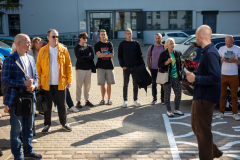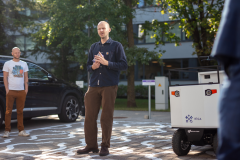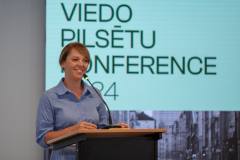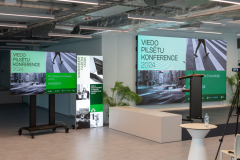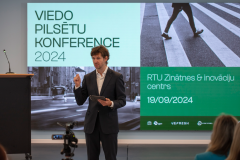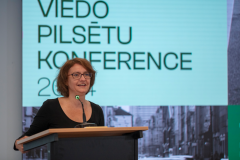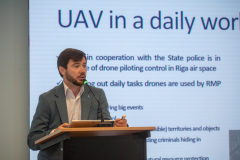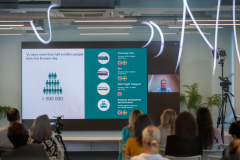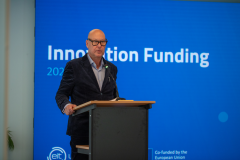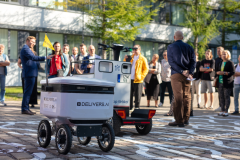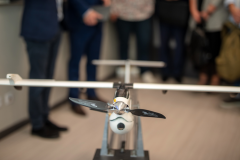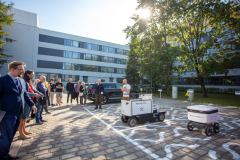On September 19, the third annual Smart Cities Conference 2024 brought together leading innovators, industry experts, and policymakers both in-person and virtually. Held at the Riga Technical University’s (RTU) Science and Innovation Center, the third annual conference focused on advancing mobility technologies and the future of urban mobility. Attendees explored cutting-edge innovations in drone traffic and autonomous transport.
The day began with an opening session featuring remarks from conference partners – Viesturs Celmiņš, Managing Director at Open Innovation Movement “VEFRESH,” Līga Gaile, Dean of the RTU Faculty of Construction and Mechanical Sciences, and Inese Andersone, Chair of the City Development Committee of Riga City Council. This was followed by a keynote speech from Kaspars Briškens, the Minister of Transport, who outlined the mobility sector development in Latvia.
A global perspective was brought to the forefront with presentations from Anders Bengtsson, Head of the EIT Urban Mobility Innovation Hub North, and Assaf Oren, Head of EcoMotion Partnerships. Bengtsson shared a vision for the future of mobility, while Oren discussed the creation of sustainable mobility ecosystems, offering insights from the EcoMotion Community. The morning continued with a presentation on the “Scale of Mobility Planning in the Riga Metropolitan Area,” led by Rūdolfs Cimdiņš, Head of the Spatial Planning Division of the Riga Planning Region.
After the presentations, the conference delved into the rising potential of urban air traffic, focusing on drone technology. Staņislavs Šeiko, Strategic Planning Specialist for Rīga City Council introduced the topic with a presentation on “Automated BGK Flights for the Safety of Citizens.” This set the stage for an engaging panel discussion on the development and challenges of drone traffic, moderated by Viesturs Celmiņš.
Panelists included:
- Staņislavs Šeiko (Rīga Municipal Police)
- Kristaps Niedols (Rīga City Development Department)
- Ilmārs Ozols (Civil Aviation Agency)
- Artūrs Kokars (Ministry of Transport)
The panel explored the practical applications and regulatory challenges of integrating drones into urban transport systems.
After a coffee break, the focus shifted to autonomous mobility, beginning with the presentation from Kai Kristoffersen, Autonomous Vehicle Project Manager at Vy Group, sharing how autonomous buses can make mobility smarter, offering a glimpse into how autonomous buses are transforming public transportation in Norway.
A second panel discussion moderated by Kristaps Kučers (RTU Science and Innovation Center), focused on the development, potential, and performance of autonomous transport. Panelists included:
- Kristaps Elvis Volks (LMT)
- Jānis Kalniņš (Ministry of Transport)
- Džineta Innusa (Rīgas Satiksme)
- Uldis Lībietis (Tet).
The panel highlighted the innovations shaping the future of urban transport and logistics, including the legal and infrastructural hurdles that need to be overcome.
The conference also provided attendees with valuable insights into funding opportunities. Anders Bengtsson presented the EIT Urban Mobility Innovation Calls, detailing European-level funding opportunities for mobility-related projects. This was followed by Egita Aizsilniece-Ibema, Head of Latvia’s Innovation and Technology Representation in Brussels, who outlined the Cascade Grant Tenders for Technology Developers.
The event concluded with technology demonstrations, allowing attendees to see Bruntor cargo scooter, Coding the Curbs smart parking system, DELIVERS.AI autonomous delivery robot, and SUBmerge Baltic autonomous underwater drone. Attendees were also invited behind the scenes for a guided tour of RTU’s laboratories.
The event was organized by Riga Technical university in cooperation with the Rīga City Council and innovation movement Vefresh. The conference was supported by the EIT Urban Mobility, the technology company “Tet” and the mobile technology company “Latvijas Mobilais Telefons” (LMT).

